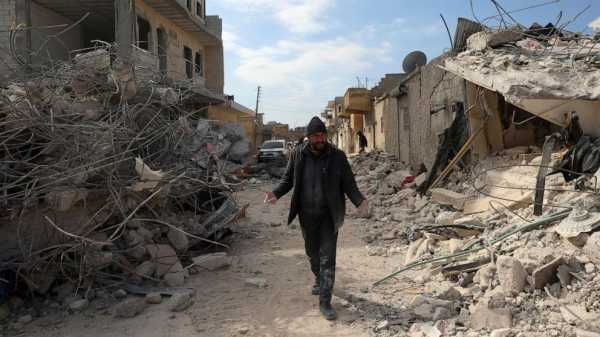
IDLIB, Syria — Schools resumed classes in Syria’s rebel-held northwest Saturday after closing for nearly three weeks following an earthquake that devastated the region, local officials said, even as many schoolchildren suffer from shock.
Many schools were turned into temporary shelters following the 7.8 magnitude earthquake that struck Turkey and neighboring parts of Syria on Feb. 6 and killed tens of thousands of people.
The quake left homeless hundreds of thousands of people in the area, many of whom had already been displaced by Syria's 12-year-long war. Because of that conflict, the rebel-held area has also struggled to receive urgently needed humanitarian aid.
Many students were absent from their classes Saturday as their homes were damaged by the quake and their families now reside far away from the schools, said Abdulkafi Al-Hamdou a citizen journalist in the rebel-held region.
“Some students were worried about being inside the building and were on edge whenever they heard a sound such as a desk being moved,” Al-Hamdou said by telephone while visiting a school. “Many students are suffering from severe fear and anxiety. They are still in shock.”
An official with the education department in the region, Ziad al-Omar, said 39 teachers and 421 students were killed by the earthquake. He added that some 250 schools suffered damage including 203 that were partially destroyed and 46 that had cracks in the walls though the structures were still standing.
Over the past days, displaced people were asked to leave schools and many of them moved into shelters to live in tents. But prices of tents have been shooting up amid shortages and sell for about $200 or four times above the pre-earthquake price. A solid tent with metal stands can cost up to $400, in a region where more than 90% of the population live in poverty and rely on aid for food and medicine.
Education officials in rebel-held Idlib said the last two hours on Saturday and Sunday will be used to train students on how to evacuate buildings during earthquakes.
One of those who lost a home in the quake is Ayesha, a resident of the town of Atareb in rural Aleppo who had to evacuate her home to live in a tent. She told The Associated Press that the temporary shelter offered to her extended family of 13 people had to be evacuated because organizers said schools are about to resume and the courtyard where tents had been set up had to be vacated.
“They gave us a tent in a school. Then they said the students have to return and they started evacuating us,” she said, giving only her first name like most women in the conservative area.
Having a big family, Ayesha rented a small house on the edge of Atareb but four days after they moved there, a new 6.4-magnitude earthquake struck on Monday. “The house, thankfully didn’t collapse, but the walls have cracks," she said. "The ceiling remained in place.”
Since then, the family has set up a tent in the street out of fear of more aftershocks.
According to the opposition’s Syrian Civil Defense, also known as White Helmets, the earthquake killed 2,274 people and injured more about 12,400 in the rebel-held region. The quake also destroyed 550 buildings and heavily damaged at least 1,570 others, according to the White Helmets.
The total death toll of the earthquake is estimated to surpass 47,000 people in Turkey and Syria — with the vast majority of deaths in Turkey.
____ Associated Press writers Sarah El Deeb and Bassem Mroue contributed to this report from Beirut.
Sourse: abcnews.go.com






